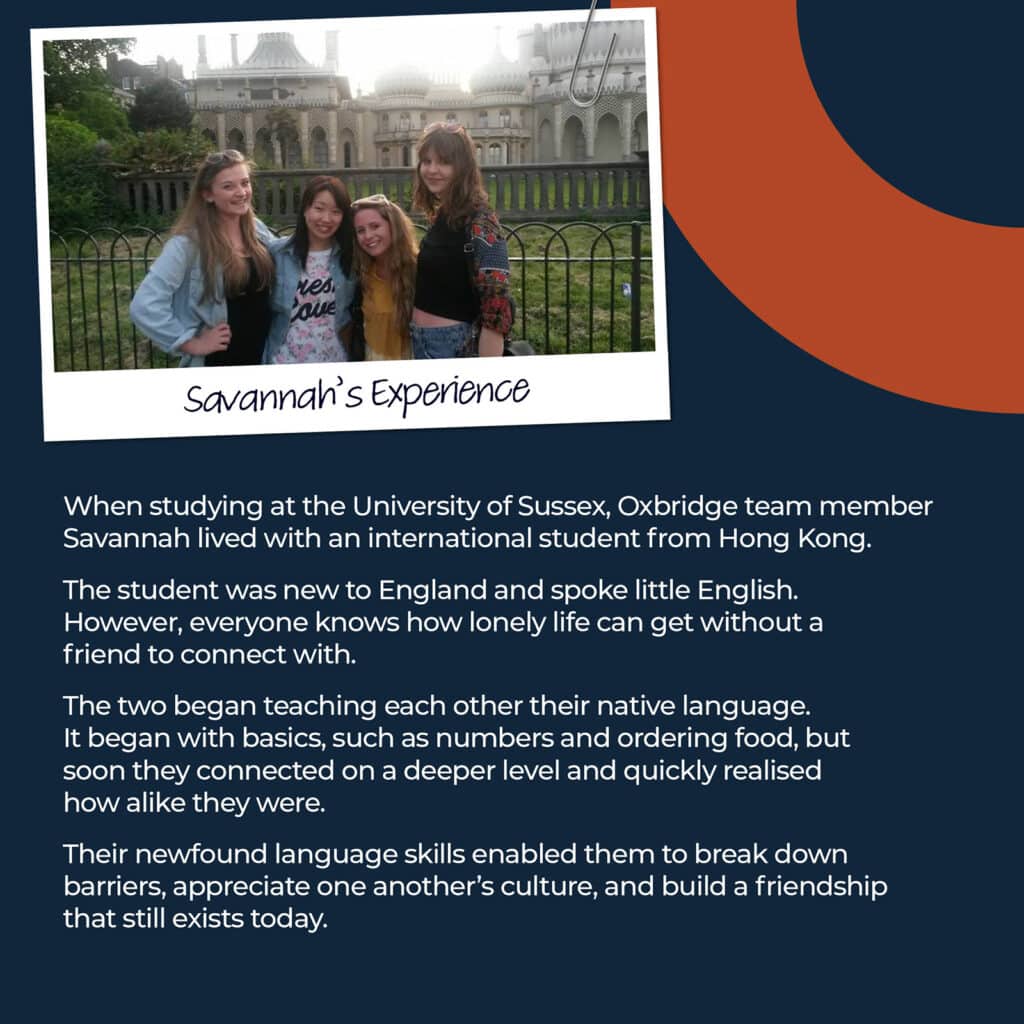Are you thinking about learning a new language? French, Spanish, Mandarin… Latin? In 2022, it’s estimated that over 50% of the world’s population is either bilingual (able to speak two languages fluently) or multilingual (three or more languages). In the UK, there are around 24.5 million bilingual adults, according to the 2021 census. Apart from being fun and rewarding, there are a host of amazing benefits that come with learning a language. Here are just five of them.
1. A New Language Gives You A Competitive Advantage
Knowledge of languages is the doorway to wisdom.
Roger Bacon

Demand for multilingual workers in the UK has been high in recent years. The Covid-19 pandemic in particular has led to many businesses realising the benefits of tools like Zoom and Microsoft Teams when conducting business internationally, and with that, comes a need to translate materials into native languages. Research suggests that three out of five businesses (58.2%) currently use multilingual voiceover and subtitling translations. Nearly six out of ten businesses (57%) now use multilingual voiceovers and subtitling for staff-facing content and meetings.
Life can get pretty competitive - especially in the real world where you want to stand out from the crowd. Between impressing admissions teams at your dream university to impressing employers once you’ve graduated, you want the greatest advantage, right? And it’s known that having a hyper-relevant and desired language skill will give you the competitive edge that you need. In short, you’ll be a step above other graduates. English speakers get a natural advantage here but there are incredible benefits to everyone becoming bilingual.
In 2017, it was reported that there were 14 million graduates in the UK. And the demand for bilinguals has doubled. Of course, graduates have varying skill levels, but they’re all looking for the same things: a step on the ladder, employment or better pay. When you learn a language, you open more doors.
Learning a second language also makes you better suited to an increasingly international market, whatever you do. You might just be hired because you have the ability to communicate with your new company’s Spanish or Chinese clients. For example, if you work for a business that trades in Spain, your ability to speak fluent Spanish makes it easier to communicate business terms, build relationships, and get your job done effectively.
You’ll also gain the ability to connect with people in other countries in ways that other tourists, travellers and migrated individuals cannot. You’ll be able to acclimatise to international settings and better engage with other cultures.
Other career advantages include: Better pay – up to 20% more per hour, higher university acceptance rates, more job opportunities, and increased job security.
2. You’ll Expand your Horizons with a Second Language
One language sets you in a corridor for life. Two languages open every door along the way.
Frank Smith

Have you ever been abroad only to feel alienated because you didn’t know a lick of the language? You walk around tourist spots filled with Brits because the only local phrases you know are Hello, Goodbye and Bread. Hardly enough to survive or branch out. And while you had a blast, imagine how much better it would have been if you knew the language. The cool local places you’d explore and the cool people you’d meet.
The lesson here? Learning a foreign language broadens your horizons. Not just for your holidays but for professional opportunities. Why? It builds perspective and increases your mobility: socially, culturally, globally.
You’ll learn to see a world beyond your precious bubble and better understand your own culture in relation to others. You’ll also enjoy more job prospects, open up destinations, and impress others with your new language skills.
After all, we’re living in a post-multicultural society. Our children are growing up with exposure to all kinds of languages. Despite this, only a tiny 34.6% of the UK population know one or more foreign languages. Maybe this wake-up call is asking us to catch up to avoid being left behind in a rapidly advancing world.
Source: ec.europa.eu
3. Language Connects You to Other Cultures
Language is the road map of a culture. It tells you where its people come from and where they are going.
Rita Mae Brown

What does culture mean to you? Is it a way of life for all groups of people? Beliefs, values and traditions in society? Is it the history of a country or region with all its undeniable characteristics? Perhaps you think of the arts, good food, literature, movies and music. Do you think it’s all those things?
It is… and more. And when you learn the language of a country or region, you experience those things with greater insight. You recognise the context of culture itself, its societal structures, ideas, and what it means to be part of a community.
Language is the foundation of all human interaction, and better comprehension enables you to better interact with those around you. Now imagine going abroad with a new language in your back pocket. Not only will it make your experience easier and more memorable, but it’ll show locals that you respect them. In return, they’ll be friendly and more receptive. After all, you’ve taken time to learn their tongue. So, they will likely commend your efforts to try and speak their language rather than forcing them to speak yours.
Johann Goethe once said, ‘Those who know nothing of foreign languages know nothing of their own.’ And it’s true. Learning a new language doesn’t just deepen your connection to other cultures. It also gives you a heightened appreciation for your own. More reflective, you’ll be a happier, smarter person.
4. Being Bilingual Works Wonders for Your Brain
Learning is a treasure that will follow its owner everywhere.
Chinese Proverb
Do you love feeding your brain with wisdom? What better nourishment than learning a new language? Research shows that by the time you’re all studied up, you’ll enjoy several health benefits, including enhanced cognitive performance. That means increased memory and attention span, better decision-making, problem-solving, as well as amplified critical thinking and listening. But that’s just the tip of the iceberg.
Learning a new language also makes you more creative. With your increased vocabulary, you’ll know more words and phrases to express yourself and engage with others. Likewise, you’ll think faster, read resourcefully, and build new confidence to learn things quickly. In addition, learning a third or fourth language becomes easier because you’ll already know all the right techniques, discipline, and approaches to take.
Several studies have also shown that strengthening brain activity through bilingualism can delay the onset of dementia and other mental health conditions by 4-5 years. After all, your brain is like a muscle that grows weak and lazy without training.
Hence, when you learn a language, your brain accesses all areas of your brain to process it. By treating your brain to a good workout, you’ll train those grey areas, clear away the cobwebs, and keep yourself active, alert and ready for action for years to come.
Tired of reading? This Ted-Ed Talk about The Benefits of a Bilingual Brain by Mia Nacamulli is worth watching:
5. A Foreign Language Helps You Develop Relationships… Or Even Find Love
If you talk to a man in a language he understands, that goes to his head. If you talk to him in his own language, that goes to his heart.
Nelson Mandela

There’s nothing more frustrating than the inability to communicate. You miss out on so many things. Like making friends, networking or connecting with those from other cultures on deeper personal levels. A foreign language gives you the skill to build those relationships with native speakers.
Learning a language is a humbling experience because it shapes who you are, your observations and perceptions of the world. But there’s more than just personal gain. Just imagine all the lives you can positively impact. Think about what you’re giving back.
By gaining the skill to understand other cultures and ethnic groups – remember, language is the road map of a culture – you effectively gain the ability to make a difference in someone’s life. You’ll gain awareness of how people live worldwide, political viewpoints, lifestyle choices, and how to adapt yourself accordingly.
Moreover, it’s proven that when you speak someone's home language, you’ll be rewarded with kindness. You become more trustworthy, well-travelled and interesting. You’ll build better relationships, which means making more friends, healthier international business partnerships, and opportunities abroad. Or even the ability to travel beyond tourist circles to explore the truth of a country. Perhaps you’ll even find love through a Paris romance in the Louvre because you know how to speak French.
Do you see how exciting the benefits of learning a language are? Unsure how to get started? Here are some tips to help you in this exciting new adventure.
6 Quick Tips to start learning a new language
Now, if you’ve reached this far, it’s likely you love the idea of studying a foreign language. But how to go about it? You can either return to college, find a night school, or enrol on a home learning course, such as one of our accredited Language courses.
However, it’ll take a real commitment from you, so to help, we’ve got a few quick learning tips!
- Set Realistic Goals: Don’t try to learn the whole language in one go. Start learning in small bursts. Better yet, categorise what you want to learn. For example, say you want to learn how to read a menu and order food in French. Set yourself a small list of phrases and words that enables you to order your favourite dishes. Let’s say, a burger, fries and a coke, along with words such as thank you, please and goodbye.
- Rinse & Repeat: Now that you know how to order food, your next step is to practice daily. Record on your phone, play it back, write words down. Reading over a word or phrase means nothing. It takes dedication and practice to learn a language.
- Watch Foreign Movies: One fun way to boost your language skills while learning is to watch movies in that language. Not only will you open your mind and eyes to some cultural classics, but you’ll get used to the way words and phrases sound. Be extra vigilant with the rewind/pause button to repeat what’s being said. Of course, don’t just watch movies without subtitles, but also, don’t only focus on the subtitles. Truly listen to what actors are saying and then practice.
- Join a Social Group: More people are learning languages every day. And what better way to learn than joining a group and interacting with other newbie learners. Facebook and other social networks have pages dedicated to this. Often, you can find useful resources, links, videos and lighthearted jokes. The best thing about social groups is the friends and connections you’ll make.
- Ask Friends for Help: No doubt about it, your friends will be psyched that you’re learning a new language. In fact, they’ll want to help you get better. There are many ways to get them involved. You might create cue cards or quizzes and turn learning into a game where the payoff is a treat.
- Conversation with Fluent Speakers: Once you’re confident enough, you might challenge yourself and have a real conversation with a fluent speaker from the country you’re learning the language of. There are meet-up groups out there supporting new speakers, but also those wanting to learn English, too. Many offer sessions daily, meaning you can learn to speak a language quicker and easier.
Now you know why learning a second language is beneficial, and you’ve got some great tips to getting started, what’s your next step? If you’re thinking of studying a language from the comfort of your own home, starting now may be your best decision. Speak to us on live chat for guidance on our courses.
